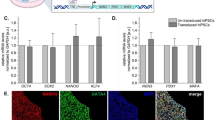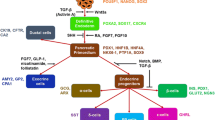Abstract
Diabetes is a complex metabolic disorder, with no available treatment. Islet transplantation is currently practiced beta cell replacement therapy option, however, with major limitations. Human pluripotent stem cells (hPSCs) can be used as a scalable source for generation of insulin-secreting cells as hPSCs have high proliferative capacity and can differentiate into any tissue type. In vitro stepwise protocols have been designed for differentiating hPSCs into pancreatic lineages that finally give rise to beta cells; however, these hPSC-derived beta cells are dissimilar to adult human beta cells in key aspects of gene expression and functionality. Alternatively, pancreatic progenitors, when transplanted in the body, have been shown to mature into functional insulin-secreting beta cells, capable of reversing hyperglycemia. These pancreatic progenitors require the co-expression of PDX1, a transcription factor (TF) regulating pancreatic development, and NKX6.1, another TF key for beta cell maturation and function, to produce glucose-responsive beta cells. Given the crucial role played by NKX6.1, we optimized an in vitro differentiation protocol to enhance the generation of pancreatic progenitors co-expressing PDX1 and NKX6.1 by modulating cell density, matrix availability, and cellular dissociation.
Access this chapter
Tax calculation will be finalised at checkout
Purchases are for personal use only
Similar content being viewed by others
References
Cnop M, Welsh N, Jonas JC, Jorns A, Lenzen S, Eizirik DL (2005) Mechanisms of pancreatic beta-cell death in type 1 and type 2 diabetes: many differences, few similarities. Diabetes 54(Suppl 2):S97–S107
Latres E, Finan DA, Greenstein JL, Kowalski A, Kieffer TJ (2019) Navigating two roads to glucose normalization in diabetes: automated insulin delivery devices and cell therapy. Cell Metab 29(3):545–563. https://doi.org/10.1016/j.cmet.2019.02.007
Vaithilingam V, Tuch BE (2011) Islet transplantation and encapsulation: an update on recent developments. Rev Diabet Stud 8(1):51–67. https://doi.org/10.1900/RDS.2011.8.51
Al-Khawaga S, Memon B, Butler AE, Taheri S, Abou-Samra AB, Abdelalim EM (2018) Pathways governing development of stem cell-derived pancreatic beta cells: lessons from embryogenesis. Biol Rev Camb Philos Soc 93(1):364–389. https://doi.org/10.1111/brv.12349
Memon B, Abdelalim EM (2020) Stem cell therapy for diabetes: beta cells versus pancreatic progenitors. Cell 9(2). https://doi.org/10.3390/cells9020283
Abdelalim EM, Bonnefond A, Bennaceur-Griscelli A, Froguel P (2014) Pluripotent stem cells as a potential tool for disease modelling and cell therapy in diabetes. Stem Cell Rev Rep 10(3):327–337. https://doi.org/10.1007/s12015-014-9503-6
Rezania A, Bruin JE, Arora P, Rubin A, Batushansky I, Asadi A, O’Dwyer S, Quiskamp N, Mojibian M, Albrecht T, Yang YH, Johnson JD, Kieffer TJ (2014) Reversal of diabetes with insulin-producing cells derived in vitro from human pluripotent stem cells. Nat Biotechnol 32(11):1121–1133. https://doi.org/10.1038/nbt.3033
Pagliuca FW, Millman JR, Gurtler M, Segel M, Van Dervort A, Ryu JH, Peterson QP, Greiner D, Melton DA (2014) Generation of functional human pancreatic beta cells in vitro. Cell 159(2):428–439. https://doi.org/10.1016/j.cell.2014.09.040
Nair GG, Liu JS, Russ HA, Tran S, Saxton MS, Chen R, Juang C, Li ML, Nguyen VQ, Giacometti S, Puri S, **ng Y, Wang Y, Szot GL, Oberholzer J, Bhushan A, Hebrok M (2019) Recapitulating endocrine cell clustering in culture promotes maturation of human stem-cell-derived β cells. Nat Cell Biol 21(2):263–274. https://doi.org/10.1038/s41556-018-0271-4
Nostro MC, Sarangi F, Yang C, Holland A, Elefanty AG, Stanley EG, Greiner DL, Keller G (2015) Efficient generation of NKX6-1+ pancreatic progenitors from multiple human pluripotent stem cell lines. Stem Cell Reports 4(4):591–604. https://doi.org/10.1016/j.stemcr.2015.02.017
Russ HA, Parent AV, Ringler JJ, Hennings TG, Nair GG, Shveygert M, Guo T, Puri S, Haataja L, Cirulli V, Blelloch R, Szot GL, Arvan P, Hebrok M (2015) Controlled induction of human pancreatic progenitors produces functional beta-like cells in vitro. EMBO J 34(13):1759–1772. https://doi.org/10.15252/embj.201591058
Hogrebe NJ, Augsornworawat P, Maxwell KG, Velazco-Cruz L, Millman JR (2020) Targeting the cytoskeleton to direct pancreatic differentiation of human pluripotent stem cells. Nat Biotechnol 38(4):460–470. https://doi.org/10.1038/s41587-020-0430-6
Rezania A, Bruin JE, Riedel MJ, Mojibian M, Asadi A, Xu J, Gauvin R, Narayan K, Karanu F, O'Neil JJ, Ao Z, Warnock GL, Kieffer TJ (2012) Maturation of human embryonic stem cell-derived pancreatic progenitors into functional islets capable of treating pre-existing diabetes in mice. Diabetes 61(8):2016–2029. https://doi.org/10.2337/db11-1711
Rezania A, Bruin JE, Xu J, Narayan K, Fox JK, O'Neil JJ, Kieffer TJ (2013) Enrichment of human embryonic stem cell-derived NKX6.1-expressing pancreatic progenitor cells accelerates the maturation of insulin-secreting cells in vivo. Stem Cells. https://doi.org/10.1002/stem.1489
Bruin JE, Erener S, Vela J, Hu X, Johnson JD, Kurata HT, Lynn FC, Piret JM, Asadi A, Rezania A, Kieffer TJ (2014) Characterization of polyhormonal insulin-producing cells derived in vitro from human embryonic stem cells. Stem Cell Res 12(1):194–208. https://doi.org/10.1016/j.scr.2013.10.003
Aigha II, Memon B, Elsayed AK, Abdelalim EM (2018) Differentiation of human pluripotent stem cells into two distinct NKX6.1 populations of pancreatic progenitors. Stem Cell Res Ther 9(1):83. https://doi.org/10.1186/s13287-018-0834-0
Memon B, Younis I, Abubaker F, Abdelalim EM (2020) PDX1-/NKX6.1+ progenitors derived from human pluripotent stem cells as a novel source of insulin-secreting cells. Diabetes Metab Res Rev e3400. https://doi.org/10.1002/dmrr.3400, in press. https://pubmed.ncbi.nlm.nih.gov/32857429/
Toyoda T, Mae S, Tanaka H, Kondo Y, Funato M, Hosokawa Y, Sudo T, Kawaguchi Y, Osafune K (2015) Cell aggregation optimizes the differentiation of human ESCs and iPSCs into pancreatic bud-like progenitor cells. Stem Cell Res 14(2):185–197. https://doi.org/10.1016/j.scr.2015.01.007
Memon B, Karam M, Al-Khawaga S, Abdelalim EM (2018) Enhanced differentiation of human pluripotent stem cells into pancreatic progenitors co-expressing PDX1 and NKX6.1. Stem Cell Res Ther 9(1):15. https://doi.org/10.1186/s13287-017-0759-z
Ali G, Elsayed AK, Nandakumar M, Bashir M, Younis I, Abu Aqel Y, Memon B, Temanni R, Abubaker F, Taheri S, Abdelalim EM (2020) Keratinocytes derived from patient-specific induced pluripotent stem cells recapitulate the genetic signature of psoriasis disease. Stem Cells Dev 29(7):383–400. https://doi.org/10.1089/scd.2019.0150
Acknowledgments
This work was funded by grants from Qatar Biomedical Research Institute (QBRI)/HBKU (Grant No. IGP 2014 009; IGP 2016 001).
Author information
Authors and Affiliations
Corresponding author
Editor information
Editors and Affiliations
Rights and permissions
Copyright information
© 2020 Springer Science+Business Media New York
About this protocol
Cite this protocol
Memon, B., Abdelalim, E.M. (2020). Highly Efficient Differentiation of Human Pluripotent Stem Cells into Pancreatic Progenitors Co-expressing PDX1 and NKX6.1. In: Nagy, A., Turksen, K. (eds) Induced Pluripotent Stem (iPS) Cells. Methods in Molecular Biology, vol 2454. Humana, New York, NY. https://doi.org/10.1007/7651_2020_323
Download citation
DOI: https://doi.org/10.1007/7651_2020_323
Published:
Publisher Name: Humana, New York, NY
Print ISBN: 978-1-0716-2118-9
Online ISBN: 978-1-0716-2119-6
eBook Packages: Springer Protocols




